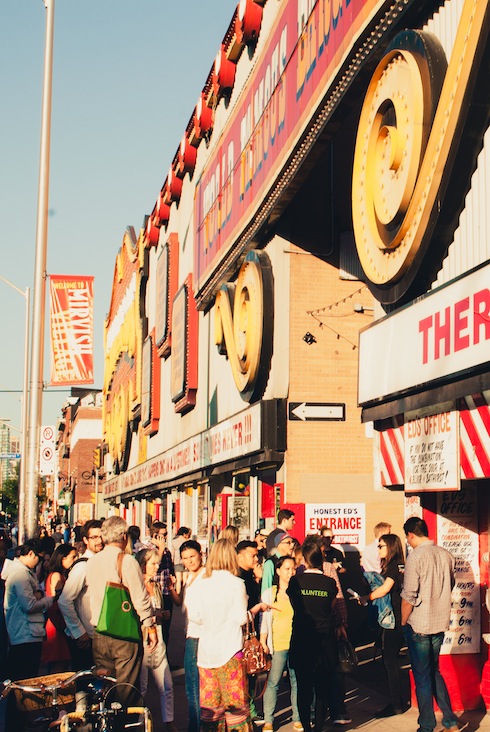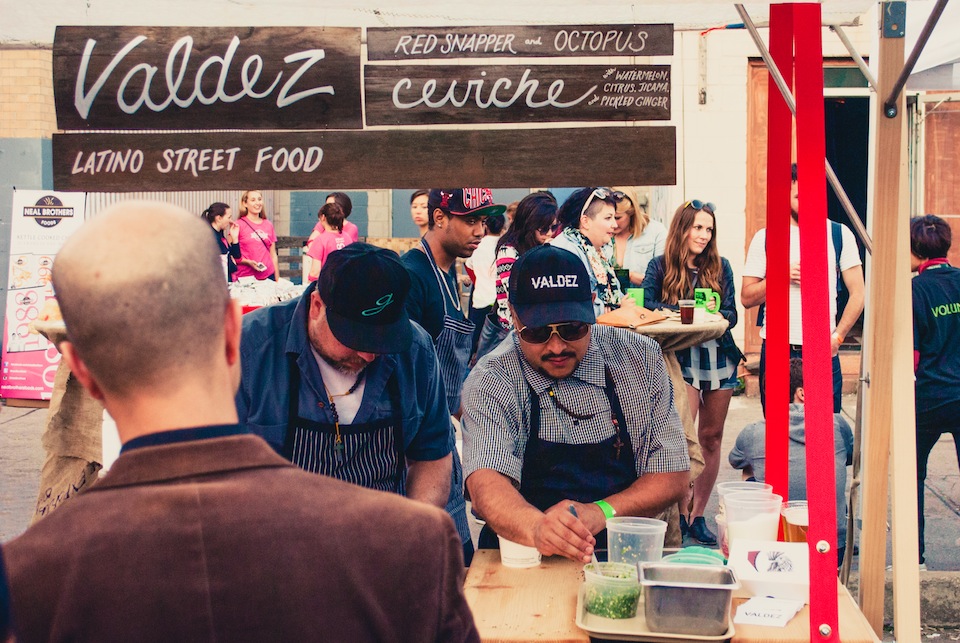
It is seven pm on a summer-like evening on Bloor. The warmth of the setting sun only adds to the electric glow of Honest Ed’s iconic facade. People are gathering but it’s not for the retail wonders offered inside – these people are steadily streaming into the alleyways and converted parking-lot-made-foodie-wonderland for The Stop’s Night Market fundraiser. As young urbanites show a growing interest in the preparation and source of their food, events like this are becoming more common. These food spectacles serve as shining examples of communities coming together and beginning to step up and put their money where their mouths are when it comes to food awareness.
On the Upper West Side of Manhattan, in the shadow of one of the greatest urban oases ever conceived, Central Park, lies a smaller but no less admirable park named after president Theodore Roosevelt. Surrounding the Museum of Natural History, this little park has a history as a focal point for community development initiatives going back 15 years. Most recently Whole Foods and The Columbus Avenue Business Improvement District (BID) came together for the 6th Annual The New Taste of the Upper West Side: an extravagant foodie fundraiser in support of sustainability and educational programs in the neighbourhood. Over the past few years, proceeds from this event have gone towards a number of worthy community initiatives including a school breakfast program, streetscape improvements and sustainable green-space infrastructure for the neighbourhood. This year the proceeds are going towards improvements to the Theodore Roosevelt Park itself: a solar-powered lighting system and trash compactor as well as a rainwater irrigation and filtration system, Manhattan’s first ever bioswale.

If there was ever an accessible and appropriate venue to sit down and talk with our peers about the struggles of the day and our hopes for the future, it is together at the dinner table; after all, there are relatively few experiences as common to us all as eating. What is being seen, particularly in large metropolitan centres, is that pride of place is, in part, tied to the culinary culture people are exposed to. Whether we are talking about the neighbourhood scale or city wide, the concept of civic identity is being increasingly recognized and evaluated based on how locals live and eat¹.
Civic responsibility too. Deep within the bubbling pot of cosmopolitan citizenship, a humbling force is stirring; proud communities are strengthening their common spaces and collective support networks through that most basic of communal rituals – breaking bread.

This is where The Stop’s approach stands out. As opposed to the BID, whose mandate is to work in the interest of the commercial viability in the area, The Stop is a not-for-profit organization based out of Toronto, that began as a simple food bank among many in the city. Now they are working towards a new concept of community food centres.
Their idea is to get away from a model of handouts. With the money they raised at events like the Night Market (and others), the Stop aims to reshape the dynamic of traditional food banks which, despite their best intentions, tend to engender a dualism of “us and them”.
For The Stop, it’s about solidarity as opposed to charity. Through a holistic vision and a comprehensive range of services and opportunities, The Stop empowers individuals with a sense of self worth and dignity through educational food-based programming and community support networks. Instead of simply being a place where a person goes, hat in hand, to receive those cans of creamed corn and stale bread from last month’s food drive, The Stop facilitates a healthy starts program for expectant mothers from low income neighborhoods on how to budget for and prepare nutritious meals. At their new Green Barn in the Wychwood ArtScape barns they organize a weekly farmers market, keep a greenhouse with a professional kitchen, wood oven and teaching space for after school programs and workshops.It’s an alternative take on local policy regarding urban hunger and food security issues, a perspective that looks at the bigger picture of our food systems.²

Events like the Night Market, and The New Taste of the Upper West Side are examples of how good food is being used to bring people together for a good purpose within their respective communities. Both these events are leveraging people’s love of food as a cornerstone for civic engagement, and community development. Here we have people mobilizing around love of food for community development and social equity.
At the core of this phenomenon is the acknowledgment that a good meal has the power to bring people together and build consensus for social development and action. Because food is such a common experience it can lay the foundation for discourse and opportunity.
By building the social infrastructure of community development around food there are plethora of ways to become engaged and actively contribute to our neighborhood development and city-building. People from every walk of life will find they have something to bring to the proverbial table. If we break bread together, then we can talk together, and learn not only about each other, but with each other.
2-In addition, The Stop continues to provide emergency food baskets to those in need and seeks to incorporate as much fresh and local produce as can be managed into their offerings.
It is seven pm on a summer-like evening on Bloor. The warmth of the setting sun only adds to the electric glow of Honest Ed’s iconic facade. People are gathering but it’s not for the retail wonders offered inside - these people are steadily streaming into the alleyways and converted parking-lot-made-foodie-wonderland for The Stop’s Night Market fundraiser. As young urbanites show a growing interest in the preparation and source of their food, events like this are becoming more common. These food spectacles serve as shining examples of communities coming together and beginning to step up and put their money where their mouths are when it comes to food awareness.
On the Upper West Side of Manhattan, in the shadow of one of the greatest urban oases ever conceived, Central Park, lies a smaller but no less admirable park named after president Theodore Roosevelt. Surrounding the Museum of Natural History, this little park has a history as a focal point for community development initiatives going back 15 years. Most recently Whole Foods and The Columbus Avenue Business Improvement District (BID) came together for the 6th Annual The New Taste of the Upper West Side: an extravagant foodie fundraiser in support of sustainability and educational programs in the neighbourhood. Over the past few years, proceeds from this event have gone towards a number of worthy community initiatives including a school breakfast program, streetscape improvements and sustainable green-space infrastructure for the neighbourhood. This year the proceeds are going towards improvements to the Theodore Roosevelt Park itself: a solar-powered lighting system and trash compactor as well as a rainwater irrigation and filtration system, Manhattan’s first ever bioswale.

If there was ever an accessible and appropriate venue to sit down and talk with our peers about the struggles of the day and our hopes for the future, it is together at the dinner table; after all, there are relatively few experiences as common to us all as eating. What is being seen, particularly in large metropolitan centres, is that pride of place is, in part, tied to the culinary culture people are exposed to. Whether we are talking about the neighbourhood scale or city wide, the concept of civic identity is being increasingly recognized and evaluated based on how locals live and eat¹.
Civic responsibility too. Deep within the bubbling pot of cosmopolitan citizenship, a humbling force is stirring; proud communities are strengthening their common spaces and collective support networks through that most basic of communal rituals - breaking bread.

This is where The Stop's approach stands out. As opposed to the BID, whose mandate is to work in the interest of the commercial viability in the area, The Stop is a not-for-profit organization based out of Toronto, that began as a simple food bank among many in the city. Now they are working towards a new concept of community food centres.
Their idea is to get away from a model of handouts. With the money they raised at events like the Night Market (and others), the Stop aims to reshape the dynamic of traditional food banks which, despite their best intentions, tend to engender a dualism of “us and them”.
For The Stop, it’s about solidarity as opposed to charity. Through a holistic vision and a comprehensive range of services and opportunities, The Stop empowers individuals with a sense of self worth and dignity through educational food-based programming and community support networks. Instead of simply being a place where a person goes, hat in hand, to receive those cans of creamed corn and stale bread from last month's food drive, The Stop facilitates a healthy starts program for expectant mothers from low income neighborhoods on how to budget for and prepare nutritious meals. At their new Green Barn in the Wychwood ArtScape barns they organize a weekly farmers market, keep a greenhouse with a professional kitchen, wood oven and teaching space for after school programs and workshops.It’s an alternative take on local policy regarding urban hunger and food security issues, a perspective that looks at the bigger picture of our food systems.²

Events like the Night Market, and The New Taste of the Upper West Side are examples of how good food is being used to bring people together for a good purpose within their respective communities. Both these events are leveraging people's love of food as a cornerstone for civic engagement, and community development. Here we have people mobilizing around love of food for community development and social equity.
At the core of this phenomenon is the acknowledgment that a good meal has the power to bring people together and build consensus for social development and action. Because food is such a common experience it can lay the foundation for discourse and opportunity.
By building the social infrastructure of community development around food there are plethora of ways to become engaged and actively contribute to our neighborhood development and city-building. People from every walk of life will find they have something to bring to the proverbial table. If we break bread together, then we can talk together, and learn not only about each other, but with each other.
1-Think about Anthony Bourdain’s “The Layover” series or the Vice’s “Munchies”, programs all about highlighting the authentic gastronomic character of cities across the world. This fascination with terroir foods and the best local restaurants provide a new sort of travel journal, a glimpse of dream vacations to distinct pockets of thriving urban culture.2-In addition, The Stop continues to provide emergency food baskets to those in need and seeks to incorporate as much fresh and local produce as can be managed into their offerings.
